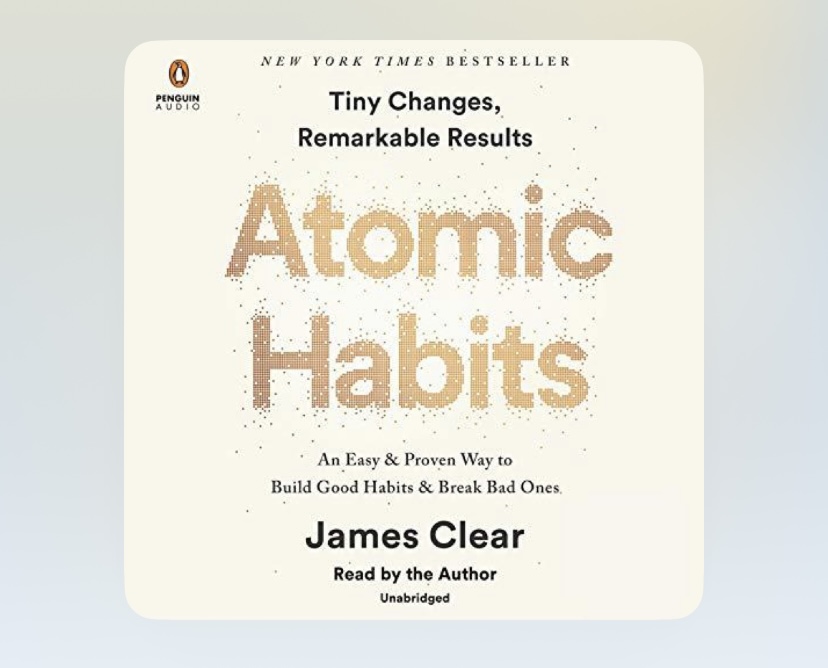If you’ve read the book Atomic Habits by James Clear, then you may already be implementing some of his practical tips on forming habits in some way, shape, or form. Although this is not a Christian book, I think there are some practical takeaways that can be applied to the Christian life. The idea of the book is that small differences can make big changes. One degree turn of an airplane can change its trajectory by hundreds of miles. Sometimes it feels like in order to get the results we want, we have to make big changes and put lots of work and time into something. But the idea of Atomic Habits is that we can make small incremental changes that over time will render big results.
In my book “You Are What You Worship,” I wrote about how we become more like what we worship. If we worship Jesus, we will become more and more like him in our character and interactions with people. And ultimately, this is the goal for all believers. But for many believers, this can feel like an uphill battle that requires tons of work. Overcoming sin, spending time with Jesus, learning to love our neighbor… these sound like mountains that we may never be able to climb.
But what if we took the principles of Atomic Habits and made a one percent change in certain areas of life? That might seem like a small thing, but over time it could produce big results. I think there are some simple habits we could adopt into our day that wouldn’t require much time or work, but could have a lasting impact on us.
I grew up in a preachers home. So being around all things Christian wasn’t foreign to me as a kid. However, I didn’t take ownership of my faith until later in life. Some of the biggest growth has been from some of the smallest, yet most important changes I made spiritually. As an adult, I began studying my Bible instead of reading my Bible. That might sound overly simple, but time with Jesus is one of those things that every Christian desires yet struggles to put into practice. So I’ve taken some of James Clear’s principles from his book and adapted them into some practical suggestions for us to implement into our day that will produce big results. Here they are:
Forget about setting goals. Focus on your system instead.
- Goals are not a bad thing. But they are also not a permanent thing. Sometimes goals can feel like mountains we have to climb while a system is something we can implement today. A goal will get us to the finish line, but a system will keep running even after it’s past the finish line.
- What if instead of trying to read through the Bible in a year we carved out a 20 minute window in our day to study five verses in the Bible. A Bible reading plan has the benefit of structure but it also comes with added pressure. The Bible never instructs us to be Bible readers, but to be Bible meditators. There is very little reward for reading a whole chapter of the Bible if we fail to understand or apply it. Five minutes of chewing on one verse is more valuable than 30 minutes speed reading through five chapters if we don’t understand what we just read. Miss a day? No problem. But never miss two in a row.
- I used to set a goal every year to read through the Bible in one calendar year, but typically I would miss a day here and there, and before January was over, I gave up trying because I was so far behind. This same thing happened to my other goals as well. I would set a goal to work out at the gym, but when I knew that I couldn’t reach the goal, I lost all motivation to try.
- But now, I have established that studying my Bible is important for my day; so I carve out time to read, meditate, and journal every day. Sometimes this doesn’t happen because life throws me a curveball. And when that happens, I try again the next day. Success is attainable every day, not just when I’ve completed the plan. Even if I’m unsuccessful today, I can be successful tomorrow. Focus on the system, not the goal.
Make your habits easy and attractive.
- Create a system that is easy and attractive. Put it on your calendar and make it appealing. Don’t just say I’m going to read for 30 minutes every day, but be specific about when and what it will look like. Take it one day at a time. My days are fairly structured, but they are rarely the same throughout the week. On Mondays and Tuesdays I have early mornings free, but on Wednesdays and Thursdays I have a different schedule because of work. So I need to adapt.
- One of the easiest, quickest, yet most impactful habits is formulating a prayer that I repeat every morning on my drive to work. I say this one sentence: “God, there is nothing more important today than my relationship with you.” This prayer normally segues into other prayers. Sometimes it’s segues into a song or a deep thought. Often, it leads me to pause in silence, but it always serves to set my priorities for the day. Because I have established the fact that I am going to say this prayer every time I get into my car in the morning, I am reminded to do this simply by getting into my car.
- When I get to my office early in the morning, I look forward to a peaceful time without interruption or noise. I make my coffee and sit down with my Bible and journal. Most days end up being noisy and busy; so a quiet peaceful morning with coffee and Jesus is attractive to me. I know there are other things I could be doing in the mornings. I could be going for walks or working out, which are all good things, but because I believe this is the most important thing for me, I have established this habit, in an easy, attainable, and attractive setting.
Build identity-based habits
- Our behaviors are a reflection of who we are. They are a result of habits that we’ve sown for years. So if we want to change our behaviors tomorrow, we need to change our habits today. And this first begins with belief about who we are and who we are becoming. As Christians, we would say that we were sinners, but now because of Jesus, we are seen in God’s eyes as holy and spotless. And though we aren’t currently perfect in practice, we will be one day. We need to take inventory of who we are now, who we are becoming, and what steps it will take to get there.
- For example, if I know that I struggle with anger and dishonesty, and that, one day by God’s grace I won’t, then I need to stop believing that I am an angry, dishonest person. I need to believe that the Holy Spirit within me will empower me to overcome these things, and so I should immediately start living as someone who is calm, patient, and honest. James Clear says that we should prove those things to ourselves with small wins. If we believe that we are no longer an angry person, and if we tell ourselves we are not going to be angry, then when a driver cuts us off, we can take a breath, take our hand off the horn, and count it as a win. We can immediately thank God for growing us in this area. And “each action is a vote for the type of person you wish to become.” When we take a step, the Holy Spirit empowers us to keep walking.
Be Mindful of the habit loop
- The habit loop is a tool for creating and breaking habits. Some of us have bad habits that we wish to break, and some have new habits we wish to implement. A tool for helping to establish and break habits is called the habit loop. The habit loop goes like this: cue, craving, response, reward. And then it repeats itself.
- Cue: The cue is the trigger that reminds us or sets us up for a repeatable behavior. For example, getting into my car serves as a cue for saying my daily morning prayer. A cue needs to be obvious and in plain sight. The inverse of this is true if I’m trying to break a habit. For example, if I have a habit of eating donuts on my way to work because I pass Dunkin’ Donuts, then I might need to consider a different route so that it’s not as easy to stop and get the donuts.
- Craving: The craving is what makes us look forward to doing this habit. We make it attractive. My example of reading my bible and journaling while drinking coffee in my peaceful office is my craving. I crave peace, and I know that mornings with Jesus will perpetuate peace throughout the day. One tip for this is called “habit-stacking.” Pair an action we want to do with an action step we need to do. If we plan to start a new habit along with an existing habit, it makes it more likely to happen. And if I’m trying to break a habit, I need to make this as unattractive as possible. I need to remember what I feel like when I eat donuts to serve as a deterrent from indulging.
- Response: Response is us taking the carrot that we dangled in front of ourselves by making it attractive. The response needs to be easy. If my bible and journal are scattered in different rooms and if the coffee is not accessible enough, then even if the craving is there I may not act on it. But because I keep my bible and journal in my laptop bag, and because my coffee mug is already on my desk and it’s easy to make, I am more likely to respond to my craving. If I want to break a habit, I need to make the habit difficult. If I want to stop eating donuts, I need to put my wallet in my trunk. I need to leave five minutes laters so I don’t have time even if I wanted. I need to put obstacles in my pathway.
- Reward: Lastly, the reward is the part that leaves me satisfied. I’ve spent time in the mornings with Jesus and I know that it is satisfying. I’ve never read my Bible and thought to myself, I wish I wouldn’t have done that. It’s rewarding. But in addition to the natural reward that comes from completing a good habit, there should be some immediate reward system built in for every time you complete a good habit. Maybe it’s using a habit tracker to keep track of a habit streak, or maybe it’s some other form of reinforcement. But if we create enjoyable rewards for incentivizing our good habits, this can help to keep us motivated.
The behaviors of tomorrow start with the habits of today; so if we want to become more like Jesus, then we should prioritize time with him today.

